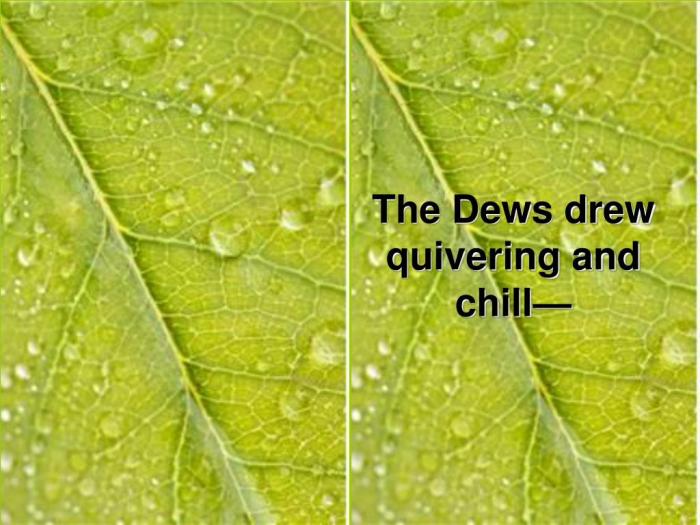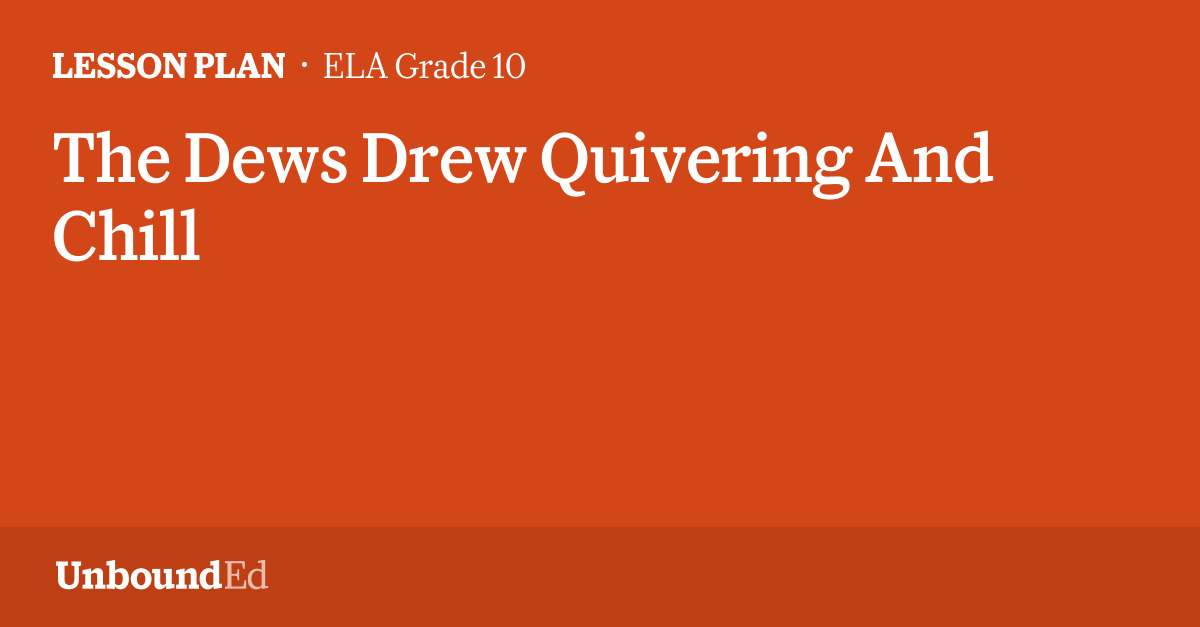The dews drew quivering and chill meaning – The phrase “the dews drew quivering and chill” from Walter de la Mare’s poem “The Listeners” evokes a vivid and evocative imagery that contributes significantly to the poem’s atmosphere and meaning. This essay delves into the literary context, poetic imagery, symbolism, figurative language, rhythm, and sound patterns associated with this phrase, exploring its multifaceted significance within the poem.
The Listeners: The Dews Drew Quivering And Chill Meaning

Walter de la Mare’s “The Listeners” is a haunting poem that explores themes of isolation, communication, and the supernatural. The poem’s opening lines, “Is there anybody there?’ said the Traveller,/ ‘Kncking on the moonlit door; / And his horse in the silence champed the grasses / Of the forest’s ferny floor”, establish a sense of mystery and unease.
The phrase “the dews drew quivering and chill” appears in the poem’s third stanza, as the Traveller approaches a deserted house. The dews, which are typically associated with freshness and vitality, are here described as “quivering and chill”, suggesting an atmosphere of decay and desolation.
Poetic Imagery
The phrase “the dews drew quivering and chill” evokes a vivid sensory image of the cold, damp night air. The use of the verb “drew” suggests that the dews are somehow alive and moving, creating a sense of unease and foreboding.
The adjective “quivering” further emphasizes the sense of movement and instability, while the adjective “chill” conveys a sense of coldness and discomfort.
This imagery contributes to the poem’s overall atmosphere of mystery and suspense. The cold, damp night air suggests a sense of isolation and loneliness, while the quivering dews create a sense of unease and foreboding. The reader is left with a sense that something is amiss, and that the Traveller is about to encounter something strange and unsettling.
Symbolism and Interpretation
The phrase “the dews drew quivering and chill” can be interpreted symbolically in a number of ways. The dews could represent the Traveller’s own feelings of isolation and loneliness. The fact that they are “quivering and chill” could suggest that he is feeling vulnerable and uncertain about his future.
Alternatively, the dews could represent the supernatural forces that are at work in the poem. The fact that they are “quivering and chill” could suggest that these forces are malevolent and dangerous.
The interpretation of the phrase “the dews drew quivering and chill” ultimately depends on the reader’s own interpretation of the poem. However, the phrase is undoubtedly rich in symbolism and can be interpreted in a number of different ways.
Figurative Language
The phrase “the dews drew quivering and chill” is an example of personification. Personification is a figure of speech that gives human qualities to non-human things. In this case, the dews are given the ability to “draw”, which is a human action.
This personification creates a sense of unease and foreboding, as it suggests that the dews are somehow alive and moving.
The use of personification in this phrase also contributes to the poem’s overall atmosphere of mystery and suspense. The reader is left with a sense that something is amiss, and that the Traveller is about to encounter something strange and unsettling.
Rhythm and Sound, The dews drew quivering and chill meaning
The phrase “the dews drew quivering and chill” is written in iambic trimeter, which is a poetic meter that consists of three pairs of unstressed and stressed syllables. This meter creates a sense of rhythm and flow, which helps to enhance the poem’s musicality.
The use of alliteration in the phrase “quivering and chill” also contributes to the poem’s musicality, as it creates a sense of repetition and emphasis.
The rhythm and sound of the phrase “the dews drew quivering and chill” contribute to the poem’s overall atmosphere of mystery and suspense. The iambic trimeter creates a sense of rhythm and flow, which helps to enhance the poem’s musicality.
The use of alliteration in the phrase “quivering and chill” also contributes to the poem’s musicality, as it creates a sense of repetition and emphasis.
Helpful Answers
What is the significance of the phrase “the dews drew quivering and chill”?
This phrase evokes a sense of coldness, dampness, and unease, contributing to the poem’s atmosphere of mystery and anticipation.
How does the imagery in this phrase contribute to the poem’s tone?
The sensory imagery of “quivering” and “chill” creates a sense of tension and unease, reflecting the speaker’s feelings of isolation and longing.
What is the possible symbolic meaning of the dews?
The dews may symbolize the speaker’s tears, representing their emotional state of sadness and loneliness.

